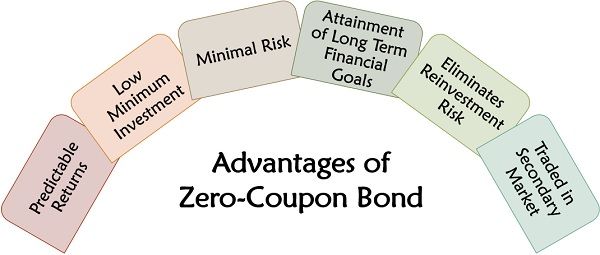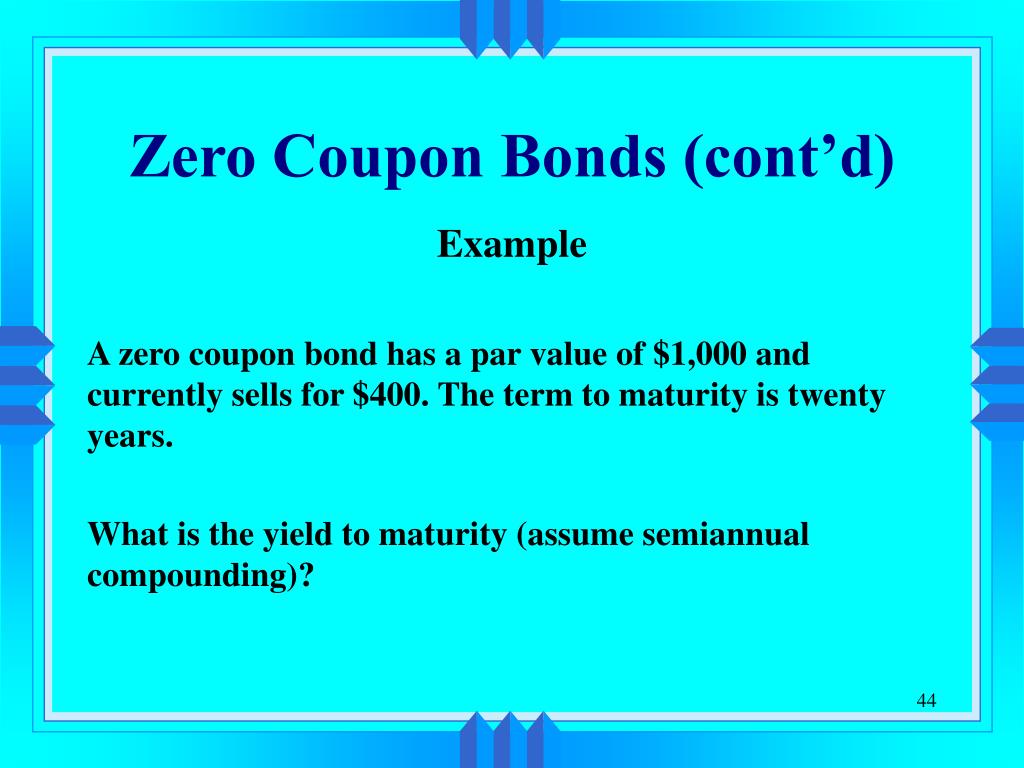41 zero coupon bonds advantages
Zero Coupon Bonds - Taxation, Advantages & Disadvantages - Fisdom Zero coupon bonds come with several benefits. The biggest is the predictability of returns. If an investor does not sell the bond prior to maturity, he/she does not have to worry about market fluctuations since the future value of the investment is known. How do you make money with a zero-coupon bond? Zero Coupon Bond | Investor.gov Because zero coupon bonds pay no interest until maturity, their prices fluctuate more than other types of bonds in the secondary market. In addition, although no payments are made on zero coupon bonds until they mature, investors may still have to pay federal, state, and local income tax on the imputed or "phantom" interest that accrues each year.
What Is a Zero-Coupon Bond? | The Motley Fool So while a traditional bond with a $10,000 face value might sell for $10,000, a zero-coupon bond with a $10,000 face value might sell for $5,000 initially. When to consider zero-coupon bonds

Zero coupon bonds advantages
What is a Zero Coupon Bond? Who Should Invest? | Scripbox A zero coupon bond is a type of fixed income security that does not pay any interest to the bondholder. It is also known as a discount bond. These bonds are issued at a discount to the face value. In other words, it trades at a deep discount. On maturity, the bond issuer pays the face value of the bond to the bondholder. What are the advantages and disadvantages of zero-coupon bond? Advantages: You can predict return Low minimum investment Minimal Risk Attainment of Long Term Financial Goals Reinvestment Risk Can trade in secondary market. Disadvantages: Maturity period of a zero-coupon bond is quite lengthy. Interest rate risk Annual Tax on Phantom Income No Regular Income Thanks Finity What are Zero Coupon Bonds? Explain some of its variants. Explain some of its variants. Zero-coupon bonds (ZCB), also known as deep discount bonds do not carry any coupon rate. They are issued at a discount and redeemable at par. The amount of discount is equal to the total return for the investor. This can be expressed in terms of interest rate, called the implicit or inherent rate of interest.
Zero coupon bonds advantages. What Is a Zero Coupon Bond? | The Motley Fool Over the 10 years, and you will collect a total of $30 in interest, plus, at the end of the term, the company pays you back your initial $100 investment. In contrast, with a zero coupon bond with ... Zero-Coupon Bond - Definition, How It Works, Formula As a zero-coupon bond does not pay periodic coupons, the bond trades at a discount to its face value. To understand why, consider the time value of money. The time value of money is a concept that illustrates that money is worth more now than an identical sum in the future - an investor would prefer to receive $100 today than $100 in one year. Zero-Coupon Bond Definition - Investopedia Regular bonds, which are also called coupon bonds, pay interest over the life of the bond and also repay the principal at maturity. A zero-coupon bond does not pay interest but instead trades at a... What is a Zero-Coupon Bond? Definition, Features, Advantages ... Advantages of Zero-Coupon Bond A zero-coupon bond is a secured form of investment when done for the long term. The various benefits it can provide are mentioned below: Predictable Returns: The return on a deeply discounted bond after maturity, is pre-known to the investor in the form of par value or face value.
Zero-Coupon Bond - an overview | ScienceDirect Topics In the US market zero-coupon bonds or "zeros" were first issued in 1981 and initially offered tax advantages for investors, who avoided the income tax charge associated with coupon bonds. 6 However the tax authorities in the US implemented legislation that treated the capital gain on zeros as income, thus wiping out the tax advantage. The ... Zero coupon bonds what are the advantages and - Course Hero Low- and zero-coupon corporate bonds are purchased mainly for tax-exempt investment accounts (such as pension funds and individual retirement accounts).Chapter 7: Bond MarketsWEBTo the issuing firm, these bonds have the advantage of requiring low or no cash outflowduring their life. Additionally, the firm is permitted to deduct the amortized ... Zero-Coupon Bonds: Pros and Cons - Management Study Guide Some of the advantages of these bonds have been mentioned below: Higher Yields: Firstly, zero-coupon bonds are perceived as higher-risk bonds. This is because investors pay money upfront and then do not have much control over it. Also, since the money is locked in over longer periods of time, the perceived risk is more. What Is a Zero-Coupon Bond? Definition, Advantages, Risks After they're issued, zero-coupon bonds trade on the secondary market like other debt securities. Advantages of zero-coupon bonds They often have higher interest rates than other bonds Since...
Zero-Coupon Bonds : What is Zero Coupon Bond? - Groww No regular income: The Zero Coupon bond provides in a lump sum; therefore, it prevents a regular cash flow. This bond will not benefit investors with the requirement of regular cash. Interest Rate Risk: Interest rates of this bond can decline over time due to fluctuation in the market. The One-Minute Guide to Zero Coupon Bonds | FINRA.org This feature offers protection from the risk that you will have to settle for a lower rate of return if your bond is called, you receive cash, and you need to reinvest it (this is known as reinvestment risk). That said, zero-coupon bonds carry various types of risk. Advantages and Risks of Zero Coupon Treasury Bonds Zero-coupon U.S. Moneys bonds are also known as Treasury zeros, and they often rise dramatically in price when stock prizes fall. However, that significant advantage also comes with several unique risks. KEY TAKEAWAYS Zero-coupon U.S. Cache bonds are also known as Treasury zeros, and they often rise dramatically in price when stock values fall. What Is a Zero-Coupon Bond? Definition, Advantages, Risks
Zero-Coupon Bonds - Accounting Hub Advantages of Zero-Coupon Bonds. Zero-coupon bonds offer several benefits to issuers and investors. These bonds are less volatile and offer predictable returns to investors. Investors are assured of fixed income at maturity, so it eliminates the reinvestment risk as there are no periodic repayments. These bonds require a low initial investment.
Zero Coupon Bond (Definition, Formula, Examples, Calculations) Zero-Coupon Bond Formula Example Zero-Coupon Bond vs. Regular Coupon Bearing Bond Advantages #1 - Predictability of Returns #2 - Removes Reinvestment Risk #3 - Longer Time frame Disadvantages #1- Illiquid Secondary Markets #2 - High Duration and Interest Rate Risk #3 -No Regular Income Recommended Articles Explanation
Zero Coupon Bond: Meaning, Features & Advantages - BondsIndia Zero-Coupon Bonds facilitates the reliable source for fixed returns provided you keep our investment until maturity. A fixed return can be earned without worrying of the market chaos. No Reinvestment Risks Zero-Coupon Bonds helps you avoid reinvestment risks. With Zero-Coupon Bonds there is no periodic coupon payment.
The Pros and Cons of Zero-Coupon Bonds - m.finweb.com Here are some of the pros and cons of investing in zero-coupon bonds. Pros One of the big advantages of zero coupon bonds is that they have higher interest rates than other corporate bonds. In order to attract investors to this type of long-term proposition, companies have to be willing to pay higher interest rates.
Advantages and Risks of Zero Coupon Treasury Bonds - Investopedia Unique Advantages of Zero-Coupon U.S. Treasury Bonds Treasury zeros zoom up in price when the Federal Reserve cuts rates, which helps them to protect stock holdings at precisely the right time. The...
Pros and Cons of Zero-Coupon Bonds | Kiplinger Instead, they're sold at a big discount to face value; when they mature, you collect the full amount. Their big advantage is that you know how much you'll collect a certain number of years from...
Zero-Coupon Bonds - Tax Professionals Member Article By Carmen Garcia A zero-coupon bond is a type of bond that earns no interest during its lifetime. A zero-coupon bond is issued with a sudden reduction in par value or face value, which is the amount that will be paid for the bond at maturity. An investor receives a one-time interest payment at maturity equal to the difference between the face value and the ...
Zero coupon bonds what are the advantages and - Course Hero ANSWER: From the perspective of the issuing firm, low or zero coupon bonds have the advantage of requiring low or no cash outflow during the life of the bond. The issuing firm is allowed to deduct the amortized discount as interest expense for federal income tax purposes, which adds to the firm's cash flow.
What are Zero Coupon Bonds? Types, Advantages & Disadvantages Special Zero Coupon Bonds have several advantages over regular Zero Coupon Bonds. For example, you can get your money back even if interest rates fall in the future and make it worth more than it was when you bought it. However, there are also some disadvantages to this type of investment:
Zero-Coupon Bonds: Definition, Formula, Example, Advantages, and ... From an investor's perspective, zero coupon bonds have the following advantages: They are safe investment instruments, and have a lower element of risk involved. Long Dated zero coupon bonds are said to be the most responsive to interest rate fluctuations.
What is a Zero-Coupon Bond? - Realonomics The Zero Coupon bonds eliminate the reinvestment risk. Zero-Coupon bonds do not let any periodic coupon payments, and hence a fixed interest on Zero Coupon bonds is guaranteed. Fixed returns: The Zero Coupon bond is a perfect choice for those who prefer long-term investment and earn a lump sum.
What are Zero Coupon Bonds? Explain some of its variants. Explain some of its variants. Zero-coupon bonds (ZCB), also known as deep discount bonds do not carry any coupon rate. They are issued at a discount and redeemable at par. The amount of discount is equal to the total return for the investor. This can be expressed in terms of interest rate, called the implicit or inherent rate of interest.
What are the advantages and disadvantages of zero-coupon bond? Advantages: You can predict return Low minimum investment Minimal Risk Attainment of Long Term Financial Goals Reinvestment Risk Can trade in secondary market. Disadvantages: Maturity period of a zero-coupon bond is quite lengthy. Interest rate risk Annual Tax on Phantom Income No Regular Income Thanks Finity
What is a Zero Coupon Bond? Who Should Invest? | Scripbox A zero coupon bond is a type of fixed income security that does not pay any interest to the bondholder. It is also known as a discount bond. These bonds are issued at a discount to the face value. In other words, it trades at a deep discount. On maturity, the bond issuer pays the face value of the bond to the bondholder.














Post a Comment for "41 zero coupon bonds advantages"